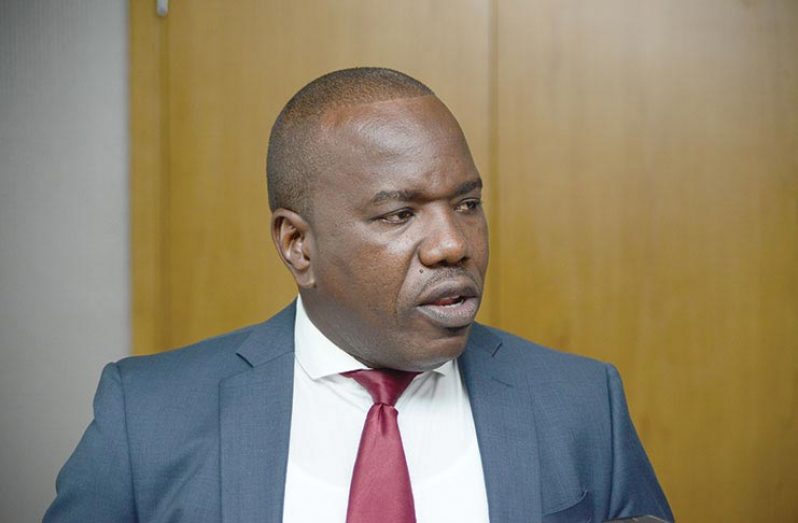– ‘Food & Drug’ warns against buying unsealed water
THE issue of the unlicensed refilling and distribution of water has significantly worsened over the past few months due to the adverse effect social distancing and other COVID-19-related restrictions have had on the functioning of the Government Analyst-Food and Drug Department (GA-FDD), particularly where carrying out inspections is concerned.
GA-FDD Director Dr. Marlon Cole said it has come to their attention that about less than 20 per cent of the approximately 50 water-processing factories countrywide that registered last year have renewed their licences for 2020. This means that around 40 or so distributors are operating with their 2019 licences.
“The COVID-19 activity has restricted our inspection activities to an extent, and the manpower to go around,” Dr. Cole said. “We have a record of all of those who are licensed for 2019, so they would be in possession of a 2019 licence. Some haven’t renewed their licence as yet.”
Cole explained that the Department hopes to have this particular issue addressed within a few weeks, just as soon as the economy starts to return to normalcy.
“In a couple of weeks’ time, that will be our first priority; we will prioritise doing the sampling to ensure that the quality of water coming out of those premises is safe,” he said.
The renewal of licences entails a re-inspection of the facilities and re-testing of a water sample from the facility to ensure that the water being bottled and sold by the company meets required standards, and is done to ensure the safety of the water being bought by the general public.
Outside of the annual inspection, companies are only monitored again if a complaint is made against them.
Here in Guyana, most households do not drink the water coming out of their taps, as they prefer to purchase filtered water, on the assumption that the product is safe.
The water is usually sold in five-gallon containers, but consumers can take their own bottles to be refilled at refilling locations, or as is the common practice, have it done right at their doors by distribution units. However, the actual safety of the water being purchased continues to come under scrutiny year after year.
“We are aware of the practice of companies not passing the water through the filtration and disinfection, and UV Light treatment. What they do is go directly to GWI sources and sell that water directly to consumers,” Cole explained.
CAUGHT IN THE ACT
He said that up until two weeks ago, the GA-FDD lacked the evidence it needed to prosecute any company, but all that changed when Arctic Waters was caught red-handed recently, refilling their tank from a fire hydrant, and fined by the Guyana Water Inc. (GWI) for tampering with their property, which carries a fine of $30,000 for residential customers, and $65,000 for non-residential ones.
Cole noted that other than being fined, Artic Waters has not been sanctioned for breaching any standards or its water processing licence, and is not likely to either, as the GA-FDD will not be investigating the incident, nor questioning the company to ascertain if the untreated water was being deceitfully resold to consumers.
“We never played any role in that; it was specifically dealt with by the water company (GWI). We don’t know for sure they were carrying it to be reprocessed or to be sold directly to consumers as raw material before treatment,” Cole said.
Noting that consumers are more susceptible to ending up with unfiltered or contaminated water when purchasing water from distributors issuing unsealed bottles, Cole said there is also an issue with many bottles often being in unappealing conditions.
Cole said though the distribution of water to consumers in unsealed bottles has been outlawed, there is not much that can be done about companies that use damaged, recycled bottles.
“Companies like DDL and Banks DIH, Cole said, “have the bottle-blowing machines, but the other companies are not allowed to place their labels on those bottles; they could be sued. So the refillers are most of the time using recycled bottles; don’t have their own bottles, so they sometimes use that of others.”
On the issue of unsealed bottles, Cole appealed to consumers to desist from purchasing water from unsealed bottles, and the practice of throwing water into the owners bottle with the aid of a funnel.
“There is a severe problem with water distributors; we have no problem with the water being distributed, but it must be sealed at the processing station, and then taken directly to the consumer,” Cole said, adding: “But what we have is that persons would walk with a funnel and throw out the water from an unsealed bottle. We’re not sure if the bottles emanate from a processing facility, or are being refilled at say Banks DIH or Providence wells.”
Outside of the current delay in the renewing of licences, Cole acknowledged that the GA-FDD continues to regularly face an uphill task with water processing factories operating unlicensed, as well as companies violating standard requirements.
Cole said it is up to consumers to ensure they are buying water from licensed facilities.
“The licence should be posted conspicuously at the facility, and if you don’t see the licence, then they should avoid buying from that facility,” Cole explained.
In cases of violations, the GA-FDD does little more than issue a “cease-and- desist” order, until the sanctioned companies rectify the situation. The companies are not fined.












